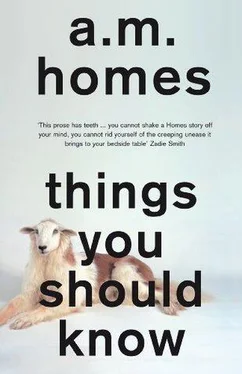She nods.
“Does he seem different to you? Are there sleep disturbances? Does he wander? Has he ever gotten combative? Paranoid?”
“He’s fine,” she says.
Now he stands in the driveway, hands on his hips. Behind him is blue sky. There is another tremor, the ground vibrates, shivers beneath his feet.
“I love that,” he says. “It reminds me of a carnival ride.”
She puts her arm through his and leads him into the house.
“I don’t know what you’re thinking,” he says, “but any which way, you’ve got the wrong idea.”
She smiles and squeezes his arm. “We’ll see.” Soledad, the housekeeper, rings a bell.
“This must be lunch,” he says when Soledad puts a bowl of soup in front of him. Every day they have the same thing — routine prevents confusion, and besides they like it that way; they have always liked it that way.
If you feed him something different, if you give him a nice big chef’s salad, he gets confused. “Did they run out of bread? What the hell kind of commissary is this?”
“What’s the story with Sibley?” he asks, lifting his bowl, sipping from the edge.
She hands him a spoon. She motions to him how to use it. He continues drinking from the bowl.
“He doesn’t seem to be getting me any work. Every week I see him; squeeze this, lift that, testing me to see if I’ve still got the juice. But then he does nothing for me. Maybe we should fire him and get someone new. How about the folks over at William Morris — there has to be someone good there. How about Swifty Lazar, I always thought he was a character.” He puts the bowl down.
“Swifty’s dead.”
“Is he? Well, then, he’s not much better than Sibley.” He trails off. “Who am I?” he asks her.
“You’re my man,” she says.
“Well, they certainly did a good job when they cast you as my wife — whose idea was that?”
“Dore Schary,” she says.
He nods. “And who am I really?”
“Who would you like to be?”
They sit in silence. “May I be excused?”
She nods. He gets up from the table and heads down the hall toward his office. Every afternoon he writes letters and pays bills. He uses an out-of-date checkbook and one-cent stamps, sometimes a whole sheet on a single envelope. He spits on the back of the sheet of stamps, rubs the spit around, and wraps the letter in postage.
“Would you like me to mail that?” she asks when he is done.
“This one’s for you,” he often says, handing her an envelope.
“I look forward to receiving it,” she says, taking the envelope from him.
Once, a letter was accidentally mailed — a five-thousand-dollar donation to a Palestinian Naturalists’ Organization — Nude in the Desert.
Every day he writes her a letter. His handwriting is unsteady and she can’t always read every word, but she tries.
Mommy—
I see you. I love you always. Love, Me.
He smiles. There are moments when she sees a glimmer, the shine that tells her he’s in there, and then it is gone.
“Lucky?” he says.
“Lucky’s no more,” she says.
“Lucy?”
She shakes her head. “That was a long time ago,” she says. “Lucky is long gone.”
She gives him a pat on the head and a quick scratch behind the ears. “Errands to run,” she says. “I’m leaving you with Philip.”
“Philip?”
“The pool boy,” she says.
“Is Philip the same as Bennett?” Bennett was his bodyguard and chauffeur from gubernatorial days.
“Yes,” she says.
“Well, why don’t you just say so? What’s all the mystery? Why don’t you call him Bennett?”
“I don’t want to confuse him,” she says.
Philip is the LPN. He fills the daily minder — pill container, doles out the herbal supplements, and gives the baths. The idea of a male nurse is so unmasculine that it sickens her. She thinks of male nurses as weaklings, serial killers, repressed homosexuals.
Philip was Dr. Sibley’s idea. For a while they had part-time help, a girl in the afternoons. One afternoon she came home from shopping and asked how he was.
“He have good lunch,” the girl said, followed by “Your husband have very big penis.”
She found him in the sunroom with an erection. “Would you look at me,” he said.
“Sometimes, as memory fades, a man becomes more aggressive, more sexual,” Sibley said. “The last thing we’d want is a bastard baby claiming to be the President’s child. Avoid the issue,” Sibley advised. “Hire this Philip fellow. He comes highly recommended. Call him the President’s personal trainer.”
From the beginning, there is something about Philip that she doesn’t like — something hard to put her finger on, something sticky, almost gooey, he is soft in the center like caramel.
She picks up the phone, dialing the extension for the pool house.
“Should I come in now?” Philip asks.
“Why else would I call?”
“Philip is going to give you your treatment, and then maybe you’ll take a little nap.”
His treatment is a bath and a massage. He has become afraid of the shower — shooting water. Every day Philip gives him a treatment.
“Don’t leave me here alone,” he says, grabbing at the edge of her skirt, clinging, begging her not to leave.
“I can’t disappoint the people, now can I?” She pries his fingers off.
“I wouldn’t be myself without you,” he says rummaging around, looking for something. “Where is my list? My lines? I’ve got calls to make. Remind me, what’s her name, with the accent? Mugs?”
“Margaret Thatcher?” Philip says.
He looks at her for confirmation. She nods.
“See you later,” she says.
He picks up the phone. It automatically rings in the kitchen. In order to get an outside line you have to dial a three-digit code.
“Operator,” Soledad says, picking up.
“Put me through to Mrs. Thatcher,” he says.
“One moment, please,” Soledad says. She makes the ring, ring sound. “Good afternoon, London here.” Soledad mimicks an English accent. “America calling,” she says, switching back to her operator voice. “I have the President on the line.”—“Jolly well, then, put him through,” she says in her English accent. “You’re on the line, sir, go ahead,” she says.
“Margaret,” he says, “she’s left me, gone for good, now it’s just the two of us. Are we on the same team? Are all our soldiers in a line? Are you packed and ready to go at a moment’s notice? Is there enough oil? Are we on the same team? Did I just ask you that?”
When she goes, she’s gone. She passes through her dressing room, freshens her face, sprays her hair, puts a red suit on, and practically runs out to the car.
Whenever she wants to be seen she wears a red suit — she has a dozen of them: Adolfo, Armani, Beene, Blass, Cassini, Dior, Galanos, Saint Laurent, Ungaro. When she goes out with him, when she goes incognito, she wears pastels. No one looks at an old woman in pastel pull-on pants.
“The Hummingbird is in the feeder.” Her agents talk into their lapels.
“Where to?” Jim asks as the gate swings open.
“Let’s go down to Rodeo and window-shop. Maybe we’ll stop at Saks or Barney’s.”
Sometimes she has the men drive her to Malibu to clear her head, sometimes she goes walking down Beverly Boulevard, like a tourist attraction. Sometimes she needs to be recognized, reminded of who she is, reminded that she is not the one evaporating.
“Notify BHPD that we’ll be in their jurisdiction. Anticipate R&W.” They radio ahead. “R&W” stands for the vicinity of Rodeo and Wilshire.
They notify the Los Angeles field office and the local police department just in case. A couple of months ago an old drag queen paraded up and down Rodeo Drive doing a convincing imitation of her, until he asked to use the ladies’ room in the GAP and came out with his skirt tucked into the back of his panty hose, flashing a flat ass and hairy thighs.
Читать дальше












